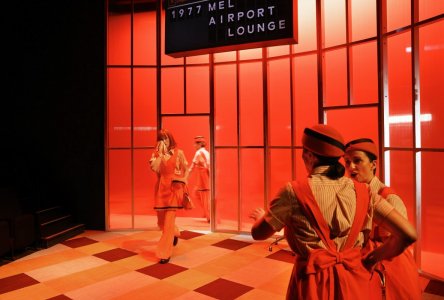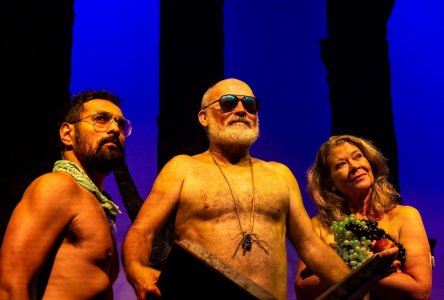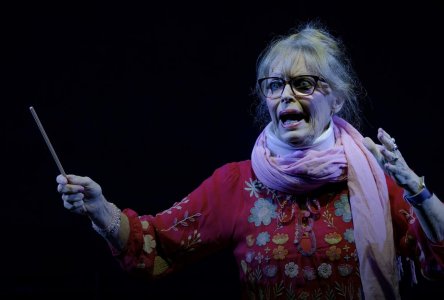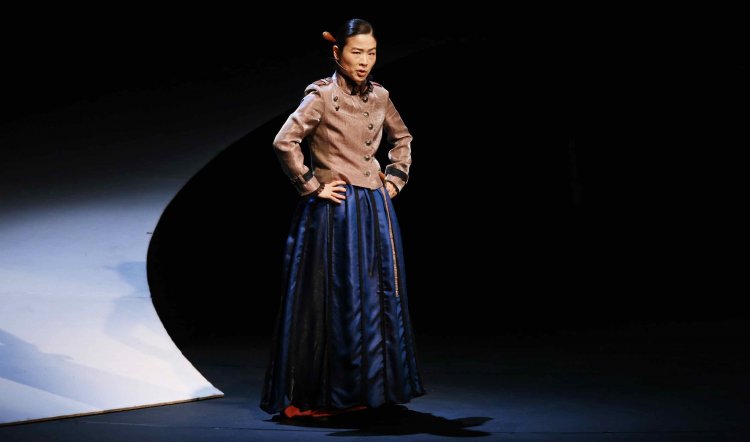
UKCHUK-GA - SYDNEY FESTIVAL 2015
UKCHUK-GA - PANSORI MOTHER COURAGE, Sydney Festival 2015 at the Drama Theatre, Sydney Opera House, January 20-21, 2015. Photography by Prudence Upton: above Lee Jaram as the general; right: as Anna - no children.
This show is what an international arts festival is all about: to be handed the chance of discovering another culture, of learning about another art form and then to be transported to another planet by an artist of sublime brilliance. Lee Jaram is that artist and her adaptation of Brecht’s Mother Courage and Her Children is the Pansori show brought so briefly to the city by the 2015 Sydney Festival.
As well as being a bona fide rock star at home in South Korea, Lee Jaram is a dedicated and renowned performer of the ancient art of Pansori. She began studying and working in the form at four years of age and is now in her mid-30s. And you don’t have to understand a word of Korean to know she is one of the most gifted actor-singers ever to grace a Sydney stage.
Pansori, also known as “Korean opera”, is a strict style of music theatre originating in the 17th century. In 2003 it was designated a UNESCO Intangible Cultural Heritage of Humanity because South Korea’s rapidly changing social and cultural landscape was threatening its continuing existence. Think PSY and the globally irresistible inanity of Gangnam Style and it becomes clear how Pansori, whose ritualistic and dense performances are between two to eight hours long, could disappear in a 3-minute video clip world.
A Pansori performance consists of a story sung, spoken and acted by a “sorikkun” (performer) accompanied by a “gosu” (drummer) who sits at a small barrel drum, playing it with one stick and one hand in call and response broken rhythms with the sorikkun while also making occasional verbal interjections to encourage or highlight the singer’s progress. Once there were twelve operas in the orally-passed-down canon, now there are just five, which is where UNESCO came in - and also Lee Jaram.
From the evidence of this show it seems that Ms Lee is both a purist and an innovator. While her delivery and interaction with the gosu are traditional, she has taken a play from the Western convention, albeit an iconoclastic work, and adapted it to the Pansori style and for a solo performer. Also, the gosu is joined on stage by a percussionist playing a wide range of instruments, including thumb piano: Hyang Ha Lee and Hongsik Kim; and a bass player/guitarist, Hyuck Joe Jang.
In the program notes, the show’s director In Woo Nam writes, apropos the choice of Brecht’s great 1939 anti-war play, “Korea is the world’s only divided country and, since the war in 1950, is currently in an armistice. While I was contemplating my next project after Sacheon-ga, North and South Korea were in a slight dispute and the possibility of war was lingering in the air. I haven’t experienced war myself and had forgotten the fact that I was living in a country still technically at war.”
As it happens, Sacheon-ga, a production that toured internationally in 2011 and 2012, is also a collaboration with Lee Jaram and is an adaptation of another Brecht text, The Good Woman of Sezchuan. And in her writer/composer’s notes for Ukchuk-ga, Ms Lee writes, “…As sad as it is, ‘How are we supposed to live within the greatest tragedy caused by war and human greed?’ is a question that has remained valid from the birth of Mother Courage 50 years ago, and still valid today with Ukchuk-ga, however it still remains unsolved.”
Nevertheless, if you’re wondering and doubting, the fact is Ms Lee has solved one thing with breathtaking bravado: the problem of the sprawling narrative and multiple characters of Mother Courage. She takes on around 15 roles, as well as that of the narrator, and armed only with the traditional white Pansori fan and minimal costume change (a wrap-around apron, a colour turn of her long skirts - designer Junghwa Kang) she becomes each character in turn.
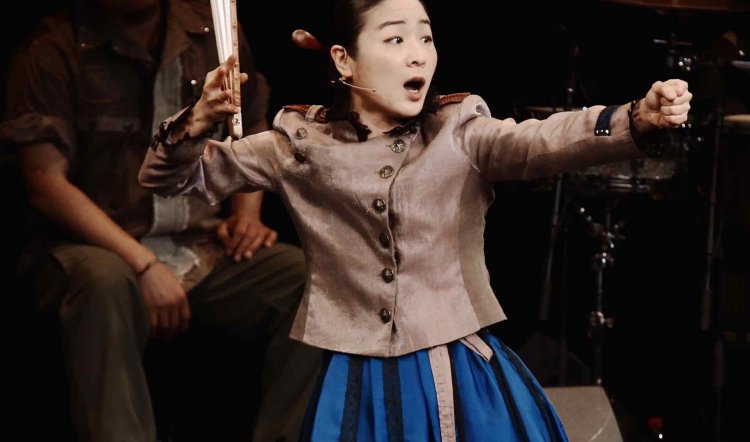
It is a bravura performance: one moment the young Anna (which means “no child” in Korean she tells us - no fourth wall in evidence here) is bargaining with a rough soldier. She is a pretty, elfin presence, all sparkling eyes and unworldly innocence and then, with a shift of her shoulders and dropped tone of voice, she is the soldier. Before long, as war drags on and the resilient trader hauls her wagon from battlefield to battlefield, Anna has first one, then two, then three children.
Then, with a subtle shapeshift in her body stance, she has become Ukchuk, an older, wiser, sadder and wearier woman. She encounters an army general and must bargain with him. Miraculously, she morphs into the fatuous, fearsome man with double chins, barrel chest and the fruity, stentorian voice of the career long-luncher. Then back to Ukchuk and on to the Kitchen man and so on. She is a powerful, intelligent, charming and therefore sexy performer. Alchemy at work.
Ukchuk-ga plays with and torments the ideas of ancient and modern dilemmas: morality in war, greed and avarice, maternal love and its absence, and human responsibilities and failings. As Ukchuk trudges the landscape of endless war she endures the pain of losing her children to it and of the struggle to continue and just be in her life. If this sounds grim - it’s not.
The underlying playful tone is set in the opening moments when Ms Lee addresses the audience (in Sydney on the second night it was about 50/50 Korean to non-Korean) with an animated and serious speech for which the surtitle screen apparently fails. Then she stops and her demeanour signals that she has been having us on. Don’t worry, she tells us, that was all in a form of old Korean that nobody understands these days, not even Koreans. And the surtitles kick in once again.
Ms Lee’s script is witty, exuberant and full of humour and light. This makes the inexorable journey to tragedy even more powerful and poignant as the 16-year-old with a “honeymoon baby” ages finally to the sad woman who has lost everything but remains agonisingly indomitable.
The standing ovations at the end were heartfelt and it was obvious that few wanted to leave the theatre after just under three hours. For me the experience was profound, thrilling and a privilege. It also left me thinking about how this woman and her collaborators are working to save and nurture an art form that could so easily be extinct if their efforts are not successful. That Ms Lee has won awards in Europe and toured the Continent and South America before this first tantalising visit to Sydney says a lot for the resilience and excellence of both actor and text.
It also made me think about the arguments we are having here over traditional versus innovative productions of western opera. It’s a great pity, for instance, that those who are currently grouching about John Bell’s Tosca - set in fascist Italy and specifically the open city of Rome in WW2 - probably did not see Ukchuk-ga and therefore have not seen its meaning: that through Lee Jaram’s vision Pansori/Korean opera is once again a living rather than fossilised form and so will find new audiences and new meaning in the 21st century. Bring it on.

